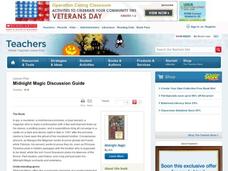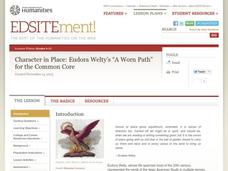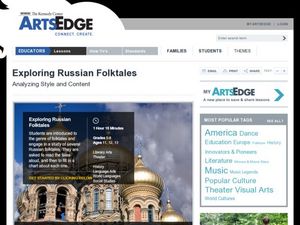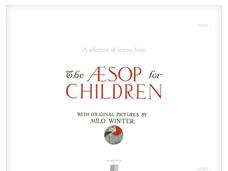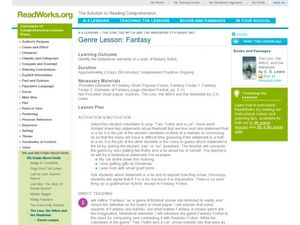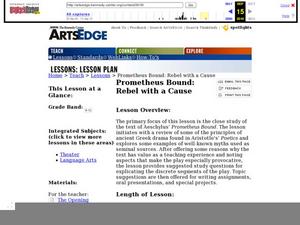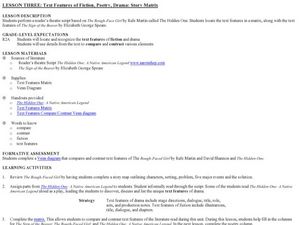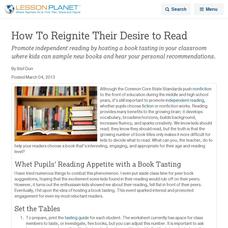EngageNY
Making a Claim: Moon Shadow’s Point of View of the Immediate Aftermath
Body paragraphs are the building blocks of every essay. Pupils view and discuss a model essay using a rubric to evaluate one of its supporting paragraphs. Next, scholars use what they've learned to continue drafting their own literary...
Smithsonian Institution
Affirmation, Assimilation, and Acculturation: Middle School
Latin American culture is deeply embedded in American culture as a whole. From the Latin rock scene in San Francisco to the hip-hop world of New York, Latin American artists have influenced every genre of modern music. Learn about the...
Curated OER
Cinderella Folk Tales: Variations in Plot and Setting
Young scholars examine plot and setting of Cinderella, and how it changes as it is translated into different cultures, discuss universal literary elements of the Cinderella story, and write narratives with original settings and plots...
Curated OER
Compare and Contrast Poems vs. Lyrics
Combine your pupils' love of music with their growing knowledge of poetry! First, have them bring in their favorite songs for a discussion on word choice and literary devices. Then, use a Venn Diagram to compare and contrast the...
Scholastic
Midnight Magic Discussion Guide
This discussion guide accompanies the fiction book Midnight Magic written by Avi, enforces story elements, inferences, and theme/plot. Have the class work on it over time, it will engage even your reluctant readers.
National Endowment for the Humanities
Character in Place: Eudora Welty’s “A Worn Path” for the Common Core
How do writers use the interaction between elements like characterization and setting to create meaning? Readers of "A Worn Path" create a series of comic book-style graphics of Eudora Welty's short story and reflect on how Welty uses...
Curated OER
Writing Folktales
Students consider the structure of folktales. In this writing skills lesson, students list the attributes of folktales that they read in class. Students then complete handouts based on the elements of the tales as well as types of tales...
Curated OER
Exploring Russian Folktales
Students examine Russian Folktales. In this folklore lesson, students discuss the attributes of common folktales they know and then discover details regarding Russian folktales. Students read 3 folktales and then complete the provided...
Library of Congress
A Selection of Stories from The Æsop for Children
Read and incorporate a variety of Aesop's Fables into a fable genre study with an eBook produced by the Library of Congress. The interactive eBook contains 146 fables written by Aesop and includes colorful interactive illustrations by...
Curated OER
Drama Genre Focus Lesson
Young scholars examine the elements of drama to develop an appreciation and understanding of the genre. In this instructional activity students read, analyze, discuss, and review a dramatic selection.
Curated OER
Understanding Genres
Young scholars identify genres of literature. For this literature instructional activity, students read definitions of the various genres. Young scholars choose books and list clues in the texts that help them identify the appropriate...
Curated OER
Genre Lesson: Fantasy
Students study the elements of fantasy in fiction as a whole group by dissecting fiction stories. For this story elements lesson, students work through a handout about fantasy to point out the elements that point to the story being...
Curated OER
Everyone's a Critic: Analyzing Sitcoms as Cultural Texts
Start by defining the word sitcom with the goal of launching a discussion. What exactly is a sitcom? How is a sitcom different from sketch comedy, drama, and reality television? Class members give examples, remember storylines they've...
EBSCO Industries
Music and Poetry
Song lyrics, like poems, are meant to be heard. After examining the literary devices in several poems, scholars examine the lyrics of popular songs and identify the sound devices and the figurative language writers use to create the...
Penguin Books
A Teacher’s Guide to the Signet Classics Edition of Mary Shelley ’s Frankenstein
Contrary to popular belief, the monster's name in Mary Shelley's Frankenstein is not Frankenstein. A teacher's guide for the novel helps readers make sense of key details in the text, define vocabulary words, and discuss prominent...
Curated OER
Prometheus Bound: Rebel with a Cause
If you are teaching Aeschylus' Prometheus Bound, you can't afford to miss this source. An extensive list of ideas outlines numerous discussion topics, writing prompts, comprehension questions, oral presentations, and projects. Have class...
National Endowment for the Humanities
Practical Criticism
As an introduction to literary criticism, class members recreate I.A. Richards' close reading experiment. Individuals select a poem, paraphrase the story, focus on the imagery used, consider what the imagery adds to the tale, and...
Reed Novel Studies
Peter Pan: Novel Study
J.M. Barrie's classic book Peter Pan is about an adventurous boy who never gets old. Scholars read the first two chapters about Peter and three young friends. They then complete worksheets by filling in sentences with vocabulary words,...
K20 LEARN
Here's How I Heard It: Using Folklore To Improve Close Reading Skills
"X" is for exaggeration, and "F" is for fact. To encourage close reading and to improve literary analysis skills, class members annotate fables and tall tales, like Paul Bunyan, with symbols that identify key features of this genre.
Curated OER
Text Features of Fiction, Poetry, Drama: Story Matrix
How do novels differ from plays? Explore with your class the text features of fiction and drama by reading The Hidden One: Native American Legend and then performing a reader’s theater script based on the story. Class members create a...
Curated OER
How To Reignite Their Desire to Read
Promote independent reading by hosting a book tasting in your classroom where kids can sample new books and hear your personal recommendations.
Curated OER
Mary Shelley's Frankenstein
Students complete close reading and analysis activities for Mary Shelley's Frankenstein. In this literature analysis lesson, students complete multiple close reading and analysis activities to evaluate the 19th century story.
Curated OER
Crane, London, and Literary Naturalism
Students identify the key characteristics that comprise American literary naturalism in Jack London's "To Build a Fire" and Stephen Crane's "The Open Boat." In this naturalism analysis activity, students identify characteristics of the...
Curated OER
Lesson 1: Faulkner's The Sound and the Fury
I love Faulkner, his experimental style and stream of consciousness are so exciting. Your learners can analyze William Faulkner and his novel, The Sound and the Fury by defining his place in American literary history and exploring his...
Other popular searches
- Comparing Literary Genres
- Types of Literary Genres
- Literary Genre Activities
- Literary Genre Unit
- Understanding Literary Genre
- Introducing Literary Genres
- Teaching Literary Genres
- Fashion and Literary Genre
- Literary Genre Definitions
- What Are Literary Genres
- List of Literary Genres
- Elements of Literary Genre






